|
Halloween Parties and Games
Reprinted from Games for Hallowe'en
by Mary E. Blain
Published in 1912
Riddles
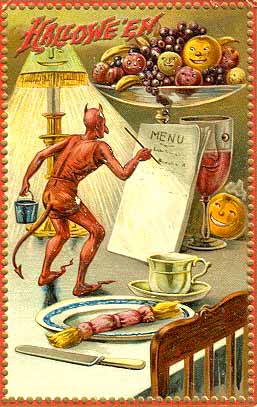 Halloween or Hallow-Even is the last night of October, being the eve or vigil of All-Hallow's or All Saint's Day, and no holiday in all the year is so informal or so marked by fun both for grown-ups as well as children as this one. On this night there should be nothing but laughter, fun and mystery. It is the night when Fairies dance, Ghosts, Witches, Devils and mischief-making Elves wander around. It is the night when all sorts of charms and spells are invoked for prying into the future by all young folks and sometimes by folks who are not young. Halloween or Hallow-Even is the last night of October, being the eve or vigil of All-Hallow's or All Saint's Day, and no holiday in all the year is so informal or so marked by fun both for grown-ups as well as children as this one. On this night there should be nothing but laughter, fun and mystery. It is the night when Fairies dance, Ghosts, Witches, Devils and mischief-making Elves wander around. It is the night when all sorts of charms and spells are invoked for prying into the future by all young folks and sometimes by folks who are not young.
Few children think they will ever tire of playing games; but all the same, towards the end of a long evening, spent merrily in dancing and playing, the little ones begin to get too weary to play any longer, and it is very difficult to keep them amused.
Then comes the time for riddles! The children may sit quietly around the room, resting after their romps and laughter, and yet be kept thoroughly interested, trying to guess riddles.
It is, however, very difficult to remember a number of good and laughable ones, so we will give a list of some, which will be quite sufficient to puzzle a roomful of little folks for several hours.
Why are weary people like carriage-wheels?
--Answer: Because they are tired.
An old woman in a red cloak was passing a field in which a goat was feeding. What strange transformation suddenly took place?
--Answer: The goat turned to butter (butt her), and the woman into a scarlet runner.
Why does a duck go into the water?
--Answer: For divers reasons.
Spell "blind pig" in two letters?
-- P G; a pig without an I.
Which bird can lift the heaviest weights?
--The crane.
Why is a wise man like a pin?
--He has a head and comes to a point.
What is that which is put on the table and cut, but never eaten?
--A pack of cards.
Why does a sculptor die horribly?
--Because he makes faces and busts.
When does a farmer double up a sheep without hurting it?
--When he folds it.
What lives upon its own substance and dies when it has devoured itself?
--A candle.
Why is a dog biting his tail a good manager?
--Because he makes both ends meet.
What thing is it that is lower with a head than without one?
--A pillow.
Which is the left side of a plum-pudding?
--That which is not eaten.
What letter of the alphabet is necessary to make a shoe?
--The last.
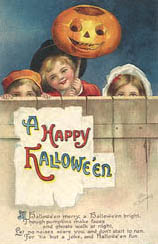 Why is it certain that "Uncle Tom's Cabin" was not written by the hand of its reputed author? Why is it certain that "Uncle Tom's Cabin" was not written by the hand of its reputed author?
--Because it was written by Mrs. Beecher's toe (Stowe).
If all the seas were dried up, what would everybody say?
--We haven't a notion (an ocean).
Why is a fishmonger never generous?
--Because his business makes him sell fish (selfish).
What is that which works when it plays and plays when it works?
--A fountain.
What is that from which you may take away the whole and yet there will be some remaining?
--The word wholesome.
Why are fowls the most economical things a farmer can keep?
--Because for every grain they give a peck.
What coin doubles its value by taking away a half of it?
--Halfpenny.
Why is it dangerous to walk in the meadows in springtime?
--Because the trees are shooting and the bulrush is out (bull rushes out).
Why is a vine like a soldier?
--Because it is listed and has ten drills (ten-drils) and shoots.
Why is an opera-singer like a confectioner?
--Because she deals in ice-creams (high screams).
If a man who is carrying a dozen glass lamps drops one, what does he become?
--A lamp lighter.
What belongs to yourself, but is used more by your friends than by yourself?
--Your name.
Why is a spider a good correspondent?
--Because she drops a line at every post.
When is the clock on the stairs dangerous?
--When it runs down.
Why is the letter "k" like a pig's tail?
--Because it comes at the end of pork.
What is the keynote to good manners?
--B natural.
Why is a five-pound bank-note much more profitable than five sovereigns?
--Because when you put it in your pocket you double it, and when you take it out you will find it increases.
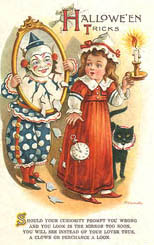 Why is a watch like a river? Why is a watch like a river?
--Because it doesn't run long without winding.
What is that which flies high, flies low, has no feet, and yet wears shoes?
--Dust.
When has a man four hands?
--When he doubles his fists.
What trees has fire no effect upon?
--Ashtrees; because when they are burned, they are ashes still.
What is the difference between a schoolmaster and an engine-driver?
-- One minds the train and the other trains the mind.
A man had twenty sick (six) sheep, and one died; how many were left?
--19.
What is that which everybody has seen but will never see again?
-- Yesterday.
Which is the best day for making a pancake?
--Friday.
Which is the smallest bridge in the world?
--The bridge of your nose.
What four letters would frighten a thief?
--O I C U.
What is that which goes from London to York without moving?
--The road.
Which is easier to spell—fiddle-de-dee or fiddle-de-dum?
--Fiddle-de-dee, because it is spelt with more "e's."
When may a chair be said to dislike you?
--When it can't bear you.
What animal took most luggage into the Ark, and which two took the least?
--The elephant, who took his trunk, while the fox and the cock had only a brush and a comb between them.
Why is B like a hot fire?
--Because it makes oil Boil.
If an egg were found on a music-stool, what poem would it remind you of?
--"The Lay of the Last Minstrel."
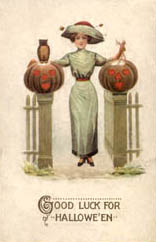 Why was the first day of Adam's life the longest? Why was the first day of Adam's life the longest?
--Because it had no Eve.
Why is a washerwoman like a navigator?
--Because she spreads her sheets, crosses the line, and goes from pole to pole.
Why is an author the queerest animal in the world?
--Because his tale comes out of his head.
Why is it that a tailor won't attend to business?
--Because he is always cutting out.
When can a horse be sea-green in color?
--When it's a bay.
Why were gloves never meant to sell?
--Because they were made to be kept on hand.
When are we all artists?
--When we draw a long face.
Why are watch-dogs bigger by night than by day?
--Because they are let out at night and taken in in the morning.
When is a tradesman always above his business?
--When he lives over his shop.
Which is the liveliest city in the world?
--Berlin; because it's always on the Spree.
Why is a water-lily like a whale?
--Because they both come to the surface to blow.
Why is a shoemaker the most industrious of men?
--Because he works to the last.
What is book-keeping?
--Forgetting to return borrowed volumes.
Why is scooping out a turnip a noisy process?
--Because it makes it hollow.
Why are teeth like verbs?
--Because they are regular, irregular, and defective.
What ships hardly ever sail out of sight?
--Hardships.
When is an artist a dangerous person?
--When his designs are bad.
Why are tortoiseshell-combs like citadels?
--They are for-tresses.
 Why is the Isthmus of Suez like the first "u" in cucumber? Why is the Isthmus of Suez like the first "u" in cucumber?
--Because it is between two "c's" (seas).
What motive led to the invention of railroads?
--The locomotive.
When is the best time to get a fresh egg at sea?
--When the ship lays to.
Who was the first whistler?
--The wind.
What tune did he whistle?
--Over the hills and far away.
Why need a traveler never starve in the desert?
--Because of the sand which is (sandwiches) there.
If a Frenchman were to fall into a tub of tallow, in what word would he express his situation?
--In-de-fat-i-gabble. (Indefatigable.)
Why is a diner on board a steam-boat like Easter Day?
--Because it is a movable feast.
Why is a little man like a good book?
--Because he is often looked over.
Why is a pig in a parlor like a house on fire?
--Because the sooner it is put out the better.
What is the difference between a soldier and a bombshell?
--One goes to war, the other goes to pieces.
Why is it dangerous to sleep in a train?
--Because every train runs over all the sleepers on the line.
Spell "enemy" in three letters?
--F O E.
Which is the only way that a leopard can change his spots?
--By going from one spot to another.
Why did Eve never fear the measles?
--Because she'd Adam.
When is a tall man a little short?
--When he hasn't got quite enough cash.
What houses are the easiest to break into?
--The houses of bald people; because their locks are few.
Why is a watch the most difficult thing to steal?
--Because it must be taken off its guard.
Why is there never anybody at home in a convent?
--Because it is an (n)uninhabited place.
Why does a person who is not good-looking make a better carpenter than one who is?
--Because he is a deal plainer.
What plant stands for No. 4?v
--IV.
What is the best tree for preserving order?
--The birch.
Why is shoemaking the easiest of trades?
--Because the boots are always soled before they are made.
How can a gardener become thrifty?
--By making the most of his thyme, and by always putting some celery in the bank.
Why is it probable that beer was made in the Ark?v
--Because the kangaroo went in with hops, and the bear was always bruin.
"What was the biggest thing you saw at the World's Fair?" asked a wife of her husband.—
"My hotel bill!" said he.
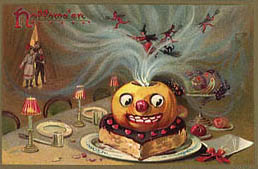 Why is C like a schoolmistress? Why is C like a schoolmistress?
--Because it forms lasses into classes.
What is that which never asks any questions and yet requires many answers?
--The street-door.
If a man bumped his head against the top of a room, what article of stationery would he be supplied with?
--Ceiling whacks. (Sealing-wax.)
Which is the longest word in the English language?
--Smiles; because there is a mile between the first and last letters.
Which is the oldest tree in England?
--The Elder Tree.
What is that which happens twice in a moment and not once in a thousand years?
--The letter M.
[Images Galina Minkova ©1999,2000 Design.]
Halloween Party Invitations
Halloween Party Decorations
Halloween Party Games
Halloween Party Forfeits and Penalties
Return to Myth for Kids Menu
|


